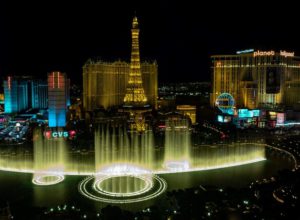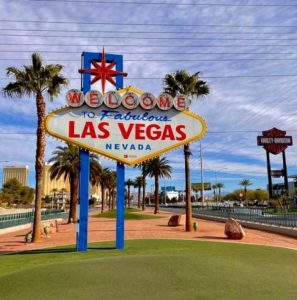The City That Never Sleeps is a veritable Mecca of the gambling world. Every year, over 40 million people visit Las Vegas to experience some of its thrills, like the casinos, Elvis impersonators, hotels, and parties. It is understandable, therefore, to wonder how this city affects the environment. This may be the key way in which online gambling and betting have the edge over land-based casinos and bookmakers, aside from promotions like Bonus eFortuna de bun venit.
Power Usage

Casinos run 24/7 and it is not unusual for each of them, on average, to receive an electric bill of about $350,000 each month. After all, a facility that welcomes guests all the time and is always ready for newcomers and regulars alike has to keep running or it will lose its patrons to its competitors.
Unfortunately, it’s not just the electricity that’s the problem here. Many sites and attractions designed to draw in tourists spend a ridiculous amount of energy. Bellagio’s water fountains and the Luxor Beam are just two of the many ludicrous displays that gobble up a tremendous amount of power without giving anything in return.
Sources
This would all be fine and dandy, were it not for the fact that the state of Nevada, like most of the US, relies on fossil fuels for most of its energy needs. The redeeming quality of the state and Las Vegas is the overall strength of the infrastructure that can handle this kind of power. However, the energy solutions used are anything but sustainable.
Outside Factors
As mentioned before, tens of millions of people visit the city every year. I’ll go out on a limb here and say that there aren’t many environmentally conscious people in search of thrills in Sin City. It remains to be seen if the influx of visitors is going to increase in the future.
On the Plus Side

Las Vegas is not as unsustainably bleak as it would seem. Hotels, casinos, and other companies are making strides to go green, even if it’s going to take some time. First of all, the traditional neons of the city are being replaced with LED, which emits more light and uses less power.
Furthermore, many hotels melt down the soaps used by their guests to make new soaps that can be sold or donated. The same goes for pillowcases, sheets, and curtains. They are either repurposed as cleaning rags or turned into fabric or purses that, again, the hotels sell or donate.
This may not seem like a big deal, but it is a giant leap from the old-school Vegas and its devil-may-care attitude. It’s certainly a step in the right direction. One last treat. Vegas is in the desert. There’s hardly any rain all year round. This means that the city is perfect for solar panels and solar farms.
As it’s in the desert and surrounded by mountains, we can expect that the city won’t intrude on the wildlife too much. Even if it starts expanding, we are entering a more ecologically-conscious age. In a century or so, we may see a clean and green Vegas.
